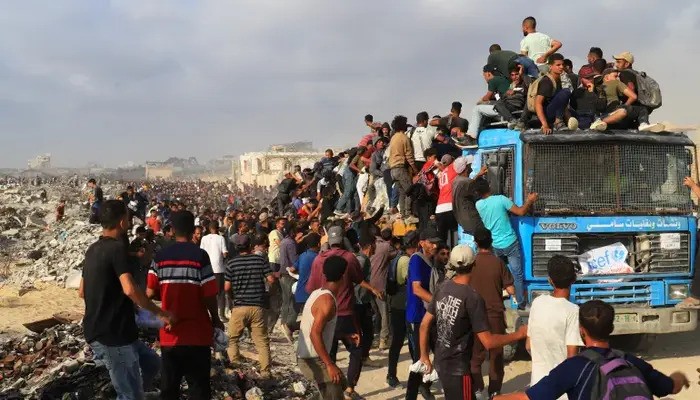The United Nations Office for the Coordination of Humanitarian Affairs (OCHA) has reported a deeply troubling health crisis in Gaza: 18,741 children have been admitted for treatment of acute malnutrition since the start of 2025. In just the first half of June, 1,648 new cases emerged — 17 of them with life-threatening complications.
Gaza’s healthcare system, already on the verge of collapse due to months of Israeli bombardment and siege, now faces an exploding malnutrition emergency. Humanitarian agencies describe the situation as catastrophic, warning that children are bearing the heaviest burden of the conflict.
“This isn’t just a food shortage — this is deliberate starvation,” said one aid worker who spoke anonymously due to security concerns. “We’re seeing toddlers with swollen bellies, infants too weak to cry, and families boiling grass for survival.”
Read: Zardari Applauds Security Forces After Major Operation
Israel’s Siege Eases, But Aid Remains ‘Critically Insufficient’
Although Israel slightly eased its blockade in May after a brutal 78-day closure, aid agencies say food access in Gaza remains nowhere near sufficient. OCHA bluntly stated that the “current volume and pace of deliveries remain critically insufficient to meet the needs” of the entire population.
With over two million Palestinians trapped in the tiny Strip, food insecurity has reached catastrophic levels. Prices of basic items like wheat flour and rice have soared, making them unaffordable for most families. All UN-supported bakeries remain shut down, choking one of the few remaining lifelines for the population.
“Consistent, frequent, large-scale deliveries through crossings are urgently needed,” OCHA stressed. Without it, there’s little hope to stabilize availability or pricing, let alone rebuild any community trust. The humanitarian crisis is now feeding broader unrest and despair among residents.
Famine Fears Grow Amid Global Inaction
Experts warn that Gaza is fast approaching a man-made famine, one that is unfolding in real-time while the international community looks away. OCHA’s latest figures are not just data points — they’re evidence of systematic deprivation under a siege that continues to limit access to food, fuel, and medical supplies.
Hospitals treating malnourished children operate without steady electricity. Mothers report traveling for hours on foot just to find a few spoonfuls of formula. In overcrowded shelters, diseases linked to poor nutrition — like diarrhea and respiratory infections — spread quickly among the young.
Meanwhile, calls for an independent humanitarian corridor continue to grow. Activists and aid groups are demanding international pressure on Israel to allow unobstructed access for food and medicine. “Every day of delay means more children pushed past the point of recovery,” said a representative from Médecins Sans Frontières.
Follow us on Instagram, YouTube, Facebook,, X and TikTok for latest updates
